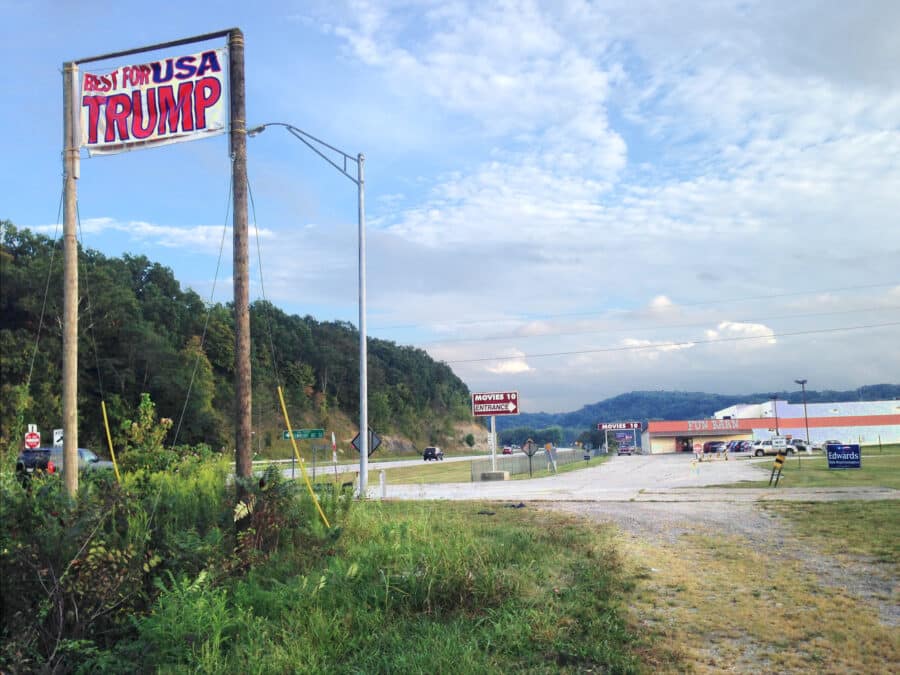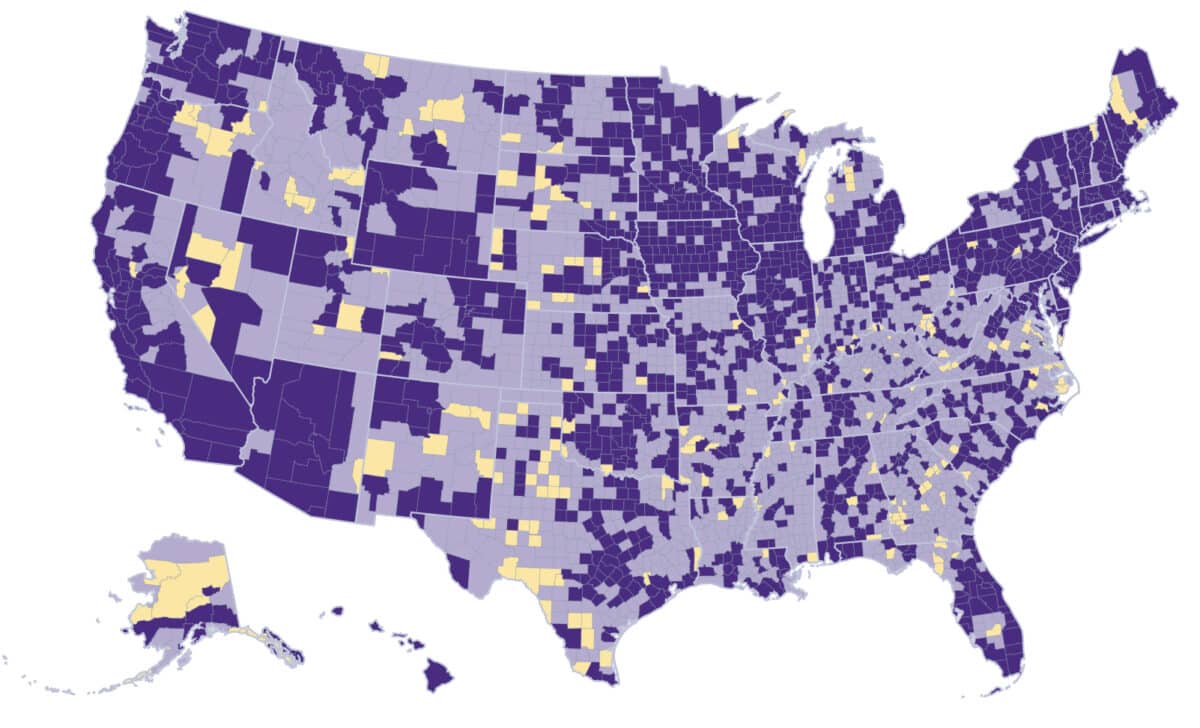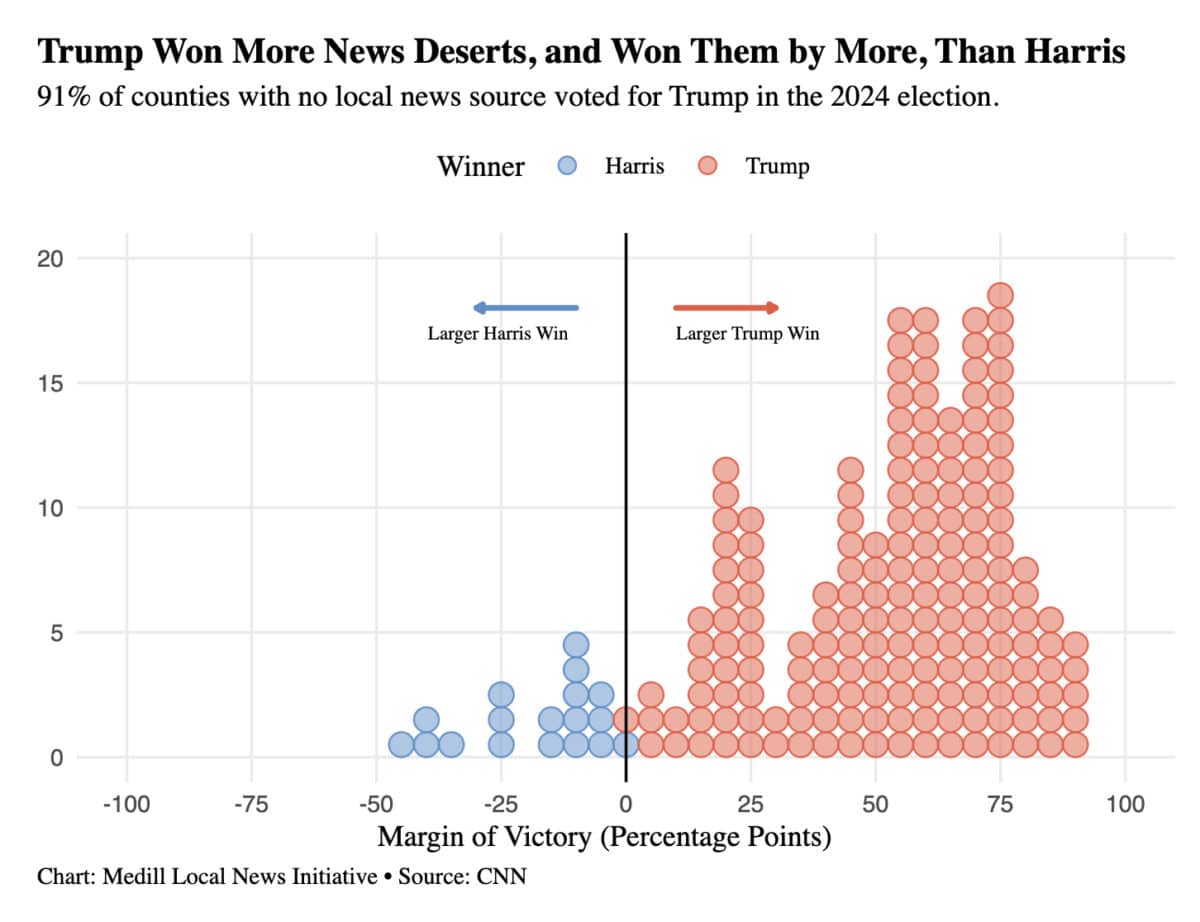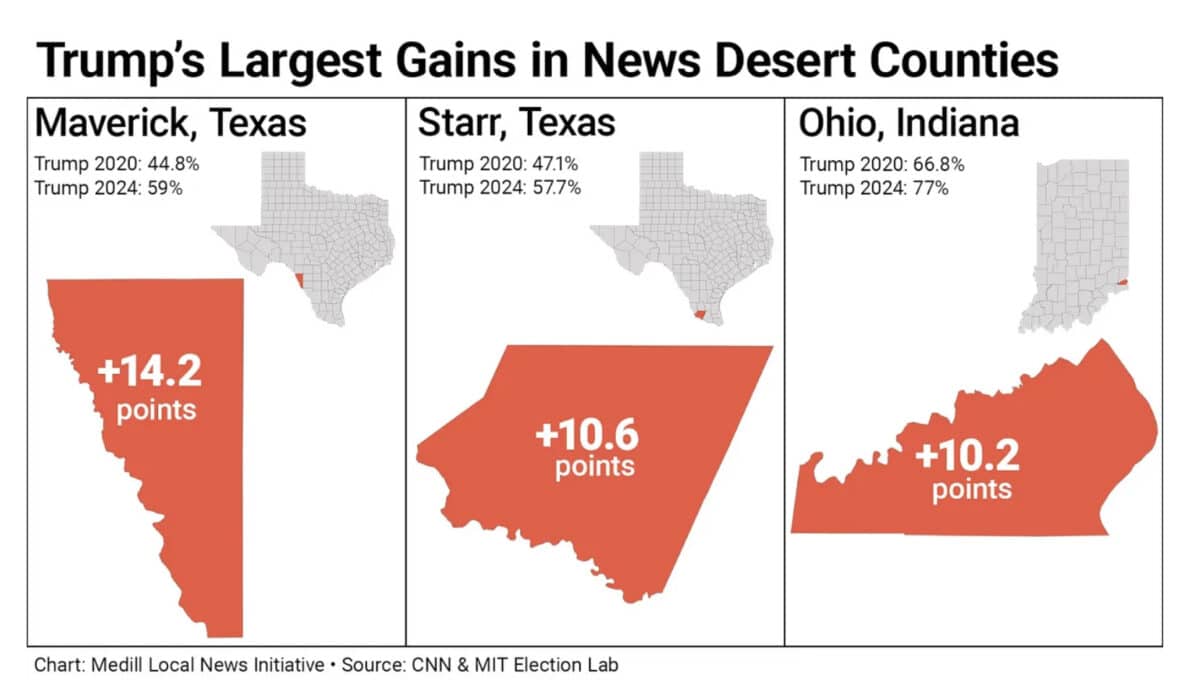Good article! When hedge funds and vulture capitalists control our small town news, we get less of it. As JFK's UN Ambassador, Adlai Stevenson, said, "As scarce as truth is, the supply seems greater than the demand." We here in St. Augustine and St. Johns County suffer from the shock of livingin a de facto news desert, where GANNETT's dumbed-down coverage has eviscerated the St. Augustine Record, founded by Henry Flagler's frontman in 1895.
This story was originally published by Barn Raiser, your independent source for rural and small town news. From Barn Raiser:
https://barnraisingmedia.com/in-rural-news-deserts-trump-won-big-2024-election/
In Rural News Deserts, Trump Won Big
The election results show “that some of the most common victims of the collapse of local news” are the same people who support Trump, says Steven Waldman, the president and founder of Rebuild Local News.
Donald Trump won the 2024 election with one of the smallest popular-vote margins in U.S. history, but in news deserts—counties lacking a professional source of local news—it was an avalanche. Trump won 91% of these counties over his Democratic rival, Kamala Harris, according to an analysis of voting data by Medill Journalism School’s State of Local News project.
While Trump’s national popular-vote margin was just under 1.5%, his margin in news deserts was massive. He won these counties by an average of 54 percentage points. In the few won by Harris, her margin was a comparatively slim 18 points, the analysis shows.

The findings are based on results from 193 of the 206 counties Medill has identified as news deserts, in states where county-level election results are currently available. The third annual State of Local News report, released by Medill’s Local News Initiative in October, documented the continuing decline of local news across the country, as measured by the number of newspapers, circulation, frequency of publication, employment and readership.


The report found that the highest concentration of counties with limited access to local news were in solidly “red” states, such as Texas, Kentucky, Arkansas, Idaho, Montana and Mississippi.
In news deserts Trump’s biggest margin of victory, in percentage terms, was in tiny King County in north Texas, which he won by 91 points (123 votes). His biggest margin of victory by votes was in Boone, Kentucky, a suburb of Cincinnati, which he won by 25,000 votes (37 points). Harris’ biggest margin by percentage points was in Allendale, South Carolina, which she won by 45 points (1,352 votes). Allendale is 85% Black with a 27% poverty rate. Her biggest margin of victory by votes was in Chesterfield, Virginia, a suburb of Richmond, which she won by 19,000 votes (9 points).

Trump’s dominance of news deserts doesn’t imply a cause and effect. That is, people didn’t necessarily vote for Trump because they lack local news. Instead, a simpler and more obvious correlation may be at work: News deserts are concentrated in counties that tend to be rural and have populations that are less educated and poorer than the national average—exactly the kind of places that went strongly for Trump in 2024 and in 2020. (The nonprofit public-policy organization Rebuild Local News found that 87% of news-desert counties went for Trump over Joe Biden four years ago.)
Granted, people who live in places without local news don’t lack access to information about a presidential election. Even if there’s no local paper or TV station, they can easily turn to national news sources such as CNN, Fox News, the New York Times; to social media; or to party and candidate campaign material to get information about the race.
But news deserts do have the potential to affect voting behavior in important ways. When voters lose access to local news, they tend to gravitate toward national news sources, according to research by Joshua P. Darr, a professor of public communications at Syracuse University. This kind of news, by definition, focuses on broad national issues—abortion, immigration, the economy, etc.—without regard to local conditions.

The result is increased polarization and partisanship, says Danny Hayes, a political science professor at George Washington University and the co-author of News Hole: The Demise of Local Journalism and Political Engagement. People base their choices on the candidates’ statements and on potentially partisan media coverage (say, Fox News or MSNBC), without regard to, or knowledge of, news about local conditions. Local news might tell a voter something that national news can’t, such as how a candidate’s policies might affect local industries or employment.
“The general argument is that local news encourages people to consider other dimensions of a candidate’s appeal besides whether they share the same partisanship,” Hayes says. If you’re regularly exposed to local news about a candidate who has brought funding to your state for roads or other projects, for example, you might be inclined to cast a vote for him or her even if you don’t share the same party affiliation.
But if you’re exposed only to national news, you’re unlikely to know about actions they’re taking, or planning to take, for your state. In that case, “the only thing that’s going to be relevant to you is which candidate shares your views on national issues,” reinforcing basic partisan identity, he says.
In fact, access to local news appears to increase split-ticket voting, moderating the partisan drift. The logic here is simple: Voters who have access to local TV news coverage of their governor and U.S. senators tend to know more about these officials, leading some of them to split their votes among Republican and Democratic candidates, according to research by Daniel J. Moskowitz, a public policy assistant professor at the University of Chicago.
A related but untested question is whether voters in news deserts are more likely to engage in ballot “roll off”—that is, vote for president but leave local and statewide races blank.
Darr, the Syracuse scholar, says roll-off voting explains “much if not all” of the margin in some Senate races this year. In news deserts, says Darr, the assumption is that voters lack information about low-level races and thus decide not to vote in these contests, a potentially harmful trend for democratic participation. “These dynamics seem particularly potent this year, and it could be worth another look,” Darr says.
News deserts have social consequences for everyone who lives in them, but the 2024 voting results indicate that conservative voters may be paying a disproportionate price, says Steven Waldman, Rebuild Local News’ president and founder.
“The wrong way to interpret this is ‘Oh, the rubes voted for Trump because they’re uninformed,’ ” says Waldman, Report for America’s former president. He pointed out that Trump also increased his support in places with relatively robust local news.
Instead, Waldman says, the election results show “that some of the most common victims of the collapse of local news” are the same people who support Trump. They’re victims, he elaborated, because of all the documented consequences of life in a news desert: more political corruption, higher taxes, lower bond ratings, greater social alienation and rising misinformation, as well as the loss of social cohesion when subjects such as high school sports, local obits and community projects aren’t covered.
The upshot, Waldman says, is that conservative voters—the very ones Trump has targeted with his attacks on the press—“should be helping to lead the drive” to save local news.
This article originally appeared on the website of The State of Local News Project at Northwestern’s Medill School of Journalism. The project tracks closures and mergers of local news outlets, as well as the emergence of new local news providers, across newspapers, digital, ethnic media and public broadcasting. The project identifies local news deserts and communities in danger of becoming news deserts, and provides a forum for thought leadership and the latest research on changes to the journalism landscape and practice.
Paul Farhi is Project Editor and Contributor at Northwestern University's Medill Local News Initiative’s The State of Local News Project. The Washington Post's former media reporter, he left the paper at the end of 2023 after nearly 36 years as a staff writer, during which he also covered business, politics and general assignment features. He has also been a senior contributing editor to the American Journalism Review and now contributes to the Atlantic, the Athletic, the Daily Beast, and Columbia Journalism Review. He has been a frequent commentator on TV and radio about the media industry.
John Volk is a research associate at Medill Local News Initiatives, where he manages, updates and analyzes the database of news organizations. A two-time Northwestern graduate (MS and BS in journalism, double major in statistics), he has previously worked at the Minnesota Star Tribune, the Local News Accelerator and Northwestern Athletics.
Have thoughts or reactions to this or any other piece that you’d like to share? Send us a note with the Letter to the Editor form.
Want to republish this story? Check out our guide.


1 comment:
With the rise of cell phones and mobile internet...the lowest common intellectual can get their news from Mike Lindell and Alex Jones. Snake oil selling is an American tradition and that's just fine with people like Trump and the Republicans. Not to mention supernatural propaganda has done a number on millions. A squid has more critical thinking skills and a dog more intellect than many of those who engage in irrational ideology and other culture traps.
Post a Comment